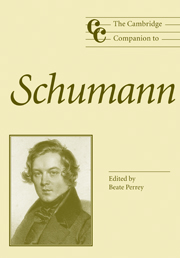11 - Schumann in his time and since
from Part III - Reception
Published online by Cambridge University Press: 28 September 2011
Summary
The image takes shape
The reactions of his immediate circle to the musical exploits of the young Schumann, from domestic music-making to performances in the school context, are known to posterity almost entirely in the form of later reminiscences: we see him in his social environment but learn little that is specifically musical. We have rather more precise information about his progress and setbacks in his study of the piano, as well as about the appearances as a soloist in Zwickau, Schneeberg and even Heidelberg. The primary source is Schumann himself, but at least he collected the opinions voiced in Heidelberg and compiled a unique list in his diary of various views (possibly edited or touched up, but clearly representative). There are no reports of the occasional performances of his music during his childhood, in private or semi-public contexts, all under his personal supervision and with his own participation, but he profited by even such modest exposure. What is clear from these events is that Schumann grew up in an environment where music was not only loved but also eagerly discussed.
After his first lessons with Kuntsch, who may have been a provincial musician but was by no means deficient in judgement or understanding, Schumann turned to various professional musicians with a reputation extending beyond Saxony in his search for a formal course of study. Carl Maria von Weber responded affirmatively to an enquiry from August Schumann, but was prevented from taking his son as a pupil: Robert suffered the deaths of potential musical fathers (Weber, 1826; Beethoven, 1827; Schubert, 1828) as well as his birth father (1826) one after another in close succession. The opinions of the teachers he then chose, or half-heartedly considered choosing, communicated as little as the compositions he sent them. At a later date he published, without attribution, the assessment of the Lieder composer Gottlieb Wiedebein as one that he could accept as fair comment.
- Type
- Chapter
- Information
- The Cambridge Companion to Schumann , pp. 221 - 251Publisher: Cambridge University PressPrint publication year: 2007

